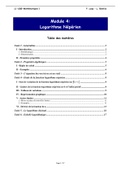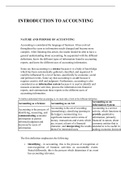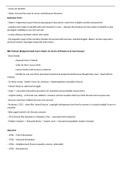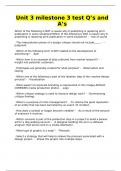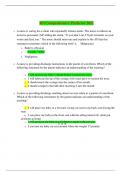Module 4:
Logarithme Népérien
Table des matières
Unité 1 - Généralités.................................................................................................................. 2
I - Introduction ................................................................................................................................... 2
1 ) Problématique ............................................................................................................................................ 2
2 ) Démonstration............................................................................................................................................ 2
II - Premières propriétés ................................................................................................................... 4
Unité 2 - Propriétés algébriques ............................................................................................... 5
I - Règles de calcul ............................................................................................................................. 5
II - Exemples ...................................................................................................................................... 6
Unité 3 - L’équation lnx=m (où m est un réel) ........................................................................ 8
Unité 4 - Etude de la fonction logarithme népérien................................................................. 8
I - Sens de variation de la fonction logarithme népérien sur 0;+ ............................................ 8
II - Limites de la fonction logarithme népérien en 0 et l’infini positif .......................................... 8
III - Tableau de variations ................................................................................................................ 9
IV - Représentation graphique ....................................................................................................... 10
V - Autres limites ............................................................................................................................. 11
1 ) Mises en place de nouvelles limites ......................................................................................................... 11
2 ) Exemples.................................................................................................................................................. 12
VI - Dérivée de la fonction ln u ....................................................................................................... 13
Unité 5 - Le logarithme décimal ............................................................................................. 16
Unité 6 - Echelle logarithmique .............................................................................................. 17
Page
,L1-SDG-Mathématiques 1 P. Loup - L. Bonifas
Module 4:
Logarithme Népérien
Unité 1 - Généralités
I - Introduction
C’est un baron écossais du nom de Néper qui inventa la fonction logarithme au seizième siècle.
En ce temps là, les calculatrices n’existaient pas, ce qui engendrait des calculs numériques
fastidieux, notamment en présence de multiplications.
L’objectif de Néper était donc d’introduire une fonction transformant les multiplications en
additions afin de simplifier les calculs.
1 ) Problématique
D’un point de vue mathématique, l’idée est de chercher une fonction numérique f définie et
dérivable sur 0;+ , telle que : a 0, b 0, f (ab) = f (a) + f (b)
On montre, que s’il existe une fonction f solution de ce problème alors sa dérivée vérifie la
k
propriété suivante : k IR, x 0, on a : f '( x) =
x
2 ) Démonstration
Supposons donc qu'il existe une fonction f solution du problème,
soit a 0 et la fonction définie par : t 0, (t ) = f (a t )
La fonction est dérivable (puisque la fonction f est dérivable) et on peut calculer sa dérivée de
deux manières différentes.
Calcul de la dérivée de
- 1ère méthode : en appliquant la dérivation des fonctions composées.
En effet, (t ) = f u (t ) avec u (t ) = at .
Page
, L1-SDG-Mathématiques 1 P. Loup - L. Bonifas
Comme : (f u(t ) ) ' = u '(t ) f '(u(t )) , on en déduit que : '(t ) = a f '(a t )
- 2ème méthode : calcul direct
On a : t 0, (t ) = f (at ) = f ( a) + f (t )
Donc : t 0, '(t ) = ( f (a) + f (t ) ) ' = f '(t )
De ces deux calculs, on en déduit l’égalité suivante : t 0, a f '(a t ) = f '(t )
En particulier, si on prend t = 1 on a : a f '(a) = f '(1)
k
On pose k = f '(1) et on conclut que : a 0, f '(a ) =
a
k
La variable étant muette, cela revient à écrire que : x 0, f '( x) =
x
On vient donc de démontrer, que sous certaines conditions, s’il existe une fonction transformant
k
la multiplication en addition alors sa dérivée est nécessairement de la forme : x 0, f '( x) = .
x
Il découle de cela le théorème suivant :
Théorème :
Il existe une unique fonction f définie sur 0;+ , dérivable, telle que
1
x 0; + , f '( x) = et f (1) = 0
x
Cette fonction est appelée logarithme népérien de x et est notée : ln x
Page

